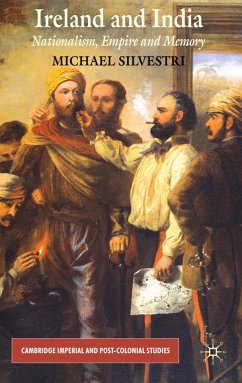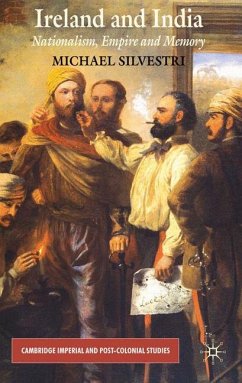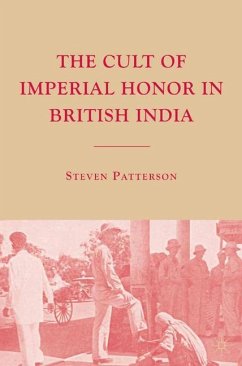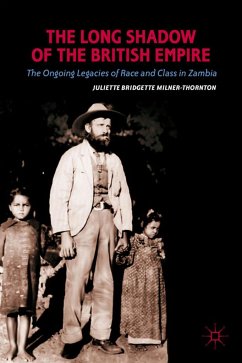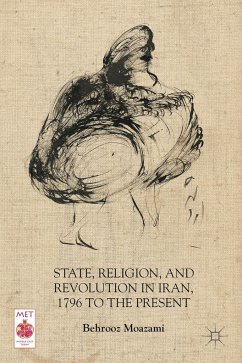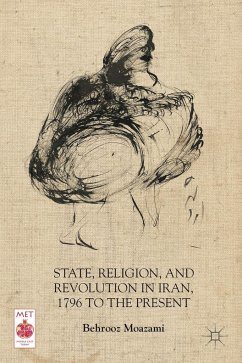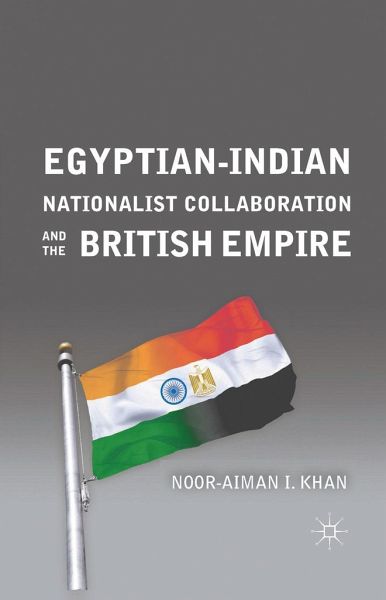
N. Khan
Broschiertes Buch
Egyptian-Indian Nationalist Collaboration and the British Empire
Versandkostenfrei!
Versandfertig in über 4 Wochen
Weitere Ausgaben:

PAYBACK Punkte
26 °P sammeln!





An examination of the collaboration between Egyptian and Indian nationalists against the British Empire, this book argues that the basis for Third World or Non-Aligned Movement was formed long before the Cold War.
NOOR KHAN Assistant Professor at Colgate University, New York, USA.
Produktdetails
- Verlag: Palgrave MacMillan Us / Palgrave Macmillan
- 2011 edition
- Seitenzahl: 233
- Erscheinungstermin: 3. Oktober 2011
- Englisch
- Abmessung: 216mm x 140mm x 13mm
- Gewicht: 295g
- ISBN-13: 9781349295340
- ISBN-10: 1349295345
- Artikelnr.: 45077511
Herstellerkennzeichnung
Libri GmbH
Europaallee 1
36244 Bad Hersfeld
gpsr@libri.de
"Khan's study points up the limits of nationalist history fixed within national space. . . The work as a whole traces a key historical shift from an anticolonial movement that remained strategically and ideologically ambivalent toward empires in general and the Ottoman Empire in particular to a global, anti-imperial campaign to establish a system of sovereign nation-states."
Arab Studies Journal
'The book is an original and important analysis of a hitherto-unexplored dimension of Egyptian nationalism. The connections and mutual influences between Egyptian and Indian nationalists in the first half of the twentieth century are occasionally alluded to in existing studies, but have yet to receive a systematic treatment such as
Arab Studies Journal
'The book is an original and important analysis of a hitherto-unexplored dimension of Egyptian nationalism. The connections and mutual influences between Egyptian and Indian nationalists in the first half of the twentieth century are occasionally alluded to in existing studies, but have yet to receive a systematic treatment such as
Mehr anzeigen
is accomplished here. The work expands our understanding of twentieth century Egyptian history while also making a contribution to the expanding field of transnational studies.' James Jankowski, Professor Emeritus, University of Colorado
'This is a remarkable and important work, which ties together disparate realms that are rarely considered in conjunction, like Egyptian and Indian nationalism, and does so with a sure mastery of the trajectories of both. Noor-Aiman Khan has produced more than just an account of the impact of the Indian independence movement on its Egyptian compatriots. She has elucidated and clarified the nature of the relationships between colonized peoples going back to before World War I, showing that these relationships were in fact the precursor of the Non-Aligned Movement.' Rashid Khalidi, Edward Said Professor of Arab Studies, Department of History, Columbia University
'The vast majority of scholarship on the colonial era focuses on the vertical relationship between the center and the periphery. Noor-Aiman Khan's important book offers a new perspective that examines the horizontal ties among the nations under colonial rule. Through careful study of the interaction between Indian and Egyptian nationalisms, Khan shows that these movements developed an awareness of their common enemy and a shared mission to build a new world order based on sovereign and independent states. Khan's work opens our eyes to new forms of transnational solidarity, collaboration, and identity that shaped both the Egyptian and Indian struggles for independence.' Bruce K. Rutherford, author of Egypt after Mubarak: Liberalism, Islam, and Democracy in the Arab World
'This is a remarkable and important work, which ties together disparate realms that are rarely considered in conjunction, like Egyptian and Indian nationalism, and does so with a sure mastery of the trajectories of both. Noor-Aiman Khan has produced more than just an account of the impact of the Indian independence movement on its Egyptian compatriots. She has elucidated and clarified the nature of the relationships between colonized peoples going back to before World War I, showing that these relationships were in fact the precursor of the Non-Aligned Movement.' Rashid Khalidi, Edward Said Professor of Arab Studies, Department of History, Columbia University
'The vast majority of scholarship on the colonial era focuses on the vertical relationship between the center and the periphery. Noor-Aiman Khan's important book offers a new perspective that examines the horizontal ties among the nations under colonial rule. Through careful study of the interaction between Indian and Egyptian nationalisms, Khan shows that these movements developed an awareness of their common enemy and a shared mission to build a new world order based on sovereign and independent states. Khan's work opens our eyes to new forms of transnational solidarity, collaboration, and identity that shaped both the Egyptian and Indian struggles for independence.' Bruce K. Rutherford, author of Egypt after Mubarak: Liberalism, Islam, and Democracy in the Arab World
Schließen
Für dieses Produkt wurde noch keine Bewertung abgegeben. Wir würden uns sehr freuen, wenn du die erste Bewertung schreibst!
Eine Bewertung schreiben
Eine Bewertung schreiben
Andere Kunden interessierten sich für


